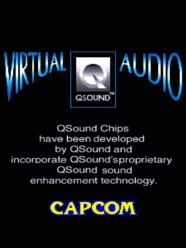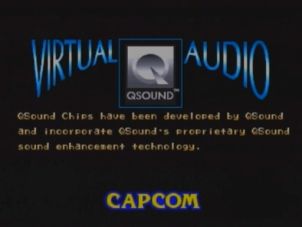Q-Sound
Jump to navigation
Jump to search
Logo descriptions by Henry Richard Carrillo
Photos by www.Segsgagadomain.com
Editions by SnowflakesOmega
Background: QSound is the original name for a positional three-dimensional (3D) sound processing algorithm from QSound Labs that creates 3D audio effects from multiple monophonic sources and sums the outputs to two channels for presentation over regular stereo speakers. QSound was eventually re-dubbed "Q1" after the introduction of "Q2," a positional 3D algorithm for headphones. As the company's spatial audio algorithm family grew, and multi-speaker surround system support was added to the positional 3D process, the QSound positional 3D audio process became known simply as "Q3D". QSound was used in most CPS-II arcade system for notable games such as Super Street Fighter II Turbo, Darkstalkers, Marvel VS Capcom, Eco Fighters, Cyberbots, Super Muscle Bomber, and it was continued for Sony ZN-1 and ZN-2 for theStreet Fighter EXseries, Rival Schools,Star Gladiator,up to Sonic Adventure for the Sega Dreamcast.
(September 10, 1993-December 22, 2003, January 19, 2006)
Logo: Basically a black screen with the Q-Sound logo in the middle and the blue words Virtual Audio surround the middle. The byline, copyrights, and how the Virtual Audio System works go on the bottom along with a normal Capcom logo on the very bottom. Usually at the end of the jingle takes you to a Winners Don't Use Drugs" Screen, copyrights, a Capcom logo, or just stays there until a demonstration of the game begins.
Availability: Pretty rare these days depending on where you live. Available on every CPS-2 supported game you can find. The version with the 1st theme is the most common and can be found on most Street Fighter, Marvel and Mega Man games. The 2nd theme is more common in Japanese CPS1/2 games although it can be found on Street Fighter Alpha 3. The 3rd theme is available on Arika games, including Street Fighter EX2 and Tetris: The Grand Master. The 4th theme has been only spotted on Dimahoo so far. It officially last appeared on Hyper Street Fighter II. It later appeared on re-releases of Capcom arcade collection games (Mainly Capcom Classics Collectionand Street Fighter Alpha Anthology, which emulates the arcade versions.) and Street Fighter Alpha 3 MAX for the PSP. The logo is removed onStreet Fighter 30th Anniversary Collection(Except Alpha 3), despite that it can be heard on the games' soundtracks in the Music section in the Museum.
Editor's Note: The logo is well known in the arcade community and it is a fan favorite.
Photos by www.Segsgagadomain.com
Editions by SnowflakesOmega
Background: QSound is the original name for a positional three-dimensional (3D) sound processing algorithm from QSound Labs that creates 3D audio effects from multiple monophonic sources and sums the outputs to two channels for presentation over regular stereo speakers. QSound was eventually re-dubbed "Q1" after the introduction of "Q2," a positional 3D algorithm for headphones. As the company's spatial audio algorithm family grew, and multi-speaker surround system support was added to the positional 3D process, the QSound positional 3D audio process became known simply as "Q3D". QSound was used in most CPS-II arcade system for notable games such as Super Street Fighter II Turbo, Darkstalkers, Marvel VS Capcom, Eco Fighters, Cyberbots, Super Muscle Bomber, and it was continued for Sony ZN-1 and ZN-2 for theStreet Fighter EXseries, Rival Schools,Star Gladiator,up to Sonic Adventure for the Sega Dreamcast.
(September 10, 1993-December 22, 2003, January 19, 2006)
<iframe frameborder="0" height="227" src="http://wikifoundrytools.com/wiki/closinglogos/widget/unknown/b9a6e3d9abdab11583cd34fb38a694b47dde6e3f" width="402"></iframe><iframe frameborder="0" height="227" src="http://wikifoundrytools.com/wiki/closinglogos/widget/unknown/af28889103e1c50a327202c0d8b888e5f9cca745" width="402"></iframe>
Logo: Basically a black screen with the Q-Sound logo in the middle and the blue words Virtual Audio surround the middle. The byline, copyrights, and how the Virtual Audio System works go on the bottom along with a normal Capcom logo on the very bottom. Usually at the end of the jingle takes you to a Winners Don't Use Drugs" Screen, copyrights, a Capcom logo, or just stays there until a demonstration of the game begins.
FX/SFX: None.
Music/Sounds: Either of those 4 themes would play, changing their style on each game:
Music/Sounds: Either of those 4 themes would play, changing their style on each game:
- Theme 1: A jazzy 12-note bell (or piano) theme with a bass guitar, ending with some chimes.
- Theme 2: A 5-note theme, with 6 more notes after the last note hits.
- Theme 3: An 11-note synth theme.
- Theme 4: Two slow ascending piano arpeggios.
Other games may have the logo silent.
Theme Variants: Below there are some notable variants of the themes (mainly the 1st one):
- Sometimes, the last note of the 1st theme is extended, making the chimes inaudible. This was spotted on some Marvel and Street Fighter games.
- The 1st theme is high-pitched on a few games including Hyper Street Fighter II.
- On Puzzle Fighter II the 12-note theme is played on a marimba.
- Sometimes the 1st theme is more random than usual.
- On the Vampire/Vampire Hunter series and a few other games the chimes are played throughout the whole theme.
- On Star Gladiator 2 the 5-note theme is played on a piano that echoes.
- On Street Fighter EX the 1st theme is played on high synthesizers.
Availability: Pretty rare these days depending on where you live. Available on every CPS-2 supported game you can find. The version with the 1st theme is the most common and can be found on most Street Fighter, Marvel and Mega Man games. The 2nd theme is more common in Japanese CPS1/2 games although it can be found on Street Fighter Alpha 3. The 3rd theme is available on Arika games, including Street Fighter EX2 and Tetris: The Grand Master. The 4th theme has been only spotted on Dimahoo so far. It officially last appeared on Hyper Street Fighter II. It later appeared on re-releases of Capcom arcade collection games (Mainly Capcom Classics Collectionand Street Fighter Alpha Anthology, which emulates the arcade versions.) and Street Fighter Alpha 3 MAX for the PSP. The logo is removed onStreet Fighter 30th Anniversary Collection(Except Alpha 3), despite that it can be heard on the games' soundtracks in the Music section in the Museum.
Editor's Note: The logo is well known in the arcade community and it is a fan favorite.

